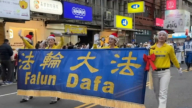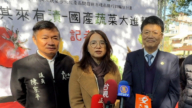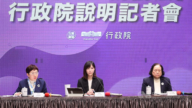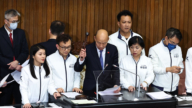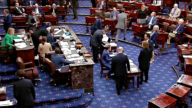【新唐人2012年1月13日讯】台湾总统及立委选举投票在即,三位总统候选人马英九、蔡英文、宋楚瑜及所代表的蓝绿橙阵营,正在做最后的冲刺。两岸和美国学者专家指出,经济与两岸议题将是影响这次总统大选的关键因素,大选结果将显示台湾人民对两岸关系未来发展的选择。
据统计,今年向台湾新闻局报名的有39国或地区的154家媒体及16家智库,共607人来台观选。马英九、蔡英文12号分别召开选前国际记者会,两岸关系再度成为关注的焦点。
有媒体问到两岸关系改善,大陆却仍有上千颗飞弹对准台湾。马英九表示,台湾绝大多数人都认同改善两岸关系,希望两岸和平、不要打仗﹔两岸任何一方片面改变现状,都要付出高昂代价。
马英九表示,目前看不出在他下一任有签和平协议的机会,他连任后也没有访问中国的计划。他的两岸政策就是“在中华民国宪法架构下,维持台海不统、不独、不武的现状”。
蔡英文的国际记者会,由民进党智库副执行长萧美琴代为主持,萧美琴重申“九二共识”不存在。国际媒体关切一旦蔡英文胜选,大陆采取强硬政策,让两岸关系陷入僵局,该如何应对?
萧美琴:“民进党一直准备和中国大陆稳定交往,我们认为和平稳定的两岸关系才是两岸人民的共同利益。我们若胜选,也会积极把握每一个和中国大陆交流的机会。”
最新的民调显示,马英九和蔡英文的支持率不相上下。蔡英文表示,未来如果执政,民进党一定会展现积极善意,尽力与中国大陆达成两岸的谅解,确保两岸关系稳定持续发展。
《美联社》报导说,经过十几年包括发射导弹和谴责独派政客的威胁后,中共近年来试图利用贸易统战影响台湾的选举,报导指出,马英九如果败选,对于主张和平解决台湾问题的胡锦涛将是一个打击,会让中共强硬派和军方有机可乘。但是,北京担心高调干预可能适得其反,因此这次很少出声。
美国在台协会台北办事处前处长包道格表示,美国的立场是支持维系台海和平稳定,无论马英九或未来的蔡英文政府,谁能维系台海稳定,都会得到美国支持。
他12号说,北京官员去年曾表达,他们对一个中国原则,可以接受不同表述。
曾在北京外交部任职的时事评论家杨恒均表示,台湾这次大选的理性平和,让大陆印象深刻。
杨恒均:“这是很大的启示,因为台湾经过了1996年大选到现在,这个选举从当时的吵吵闹闹、引起的什么导弹啦,用统独来作议题﹔到现在他们非常平稳,给我们的感觉真是波澜不惊,包括3个候选人都非常理性,民众也非常平和,这种民主给人感觉非常好。”
台湾《央广》评论指出,两岸之间历经风雨,台湾选民经过无数选战的洗礼,民主意念已更加深化,民众将以自由意志投下手中的一票,选举的结果掌握在台湾人民自己的手上。
新唐人记者常春、李元翰、萧宇采访报导。
—————–
Countdown to 2012 Taiwan election: Voters Consider the Cross-Strait Future
As the 2012 presidential and legislative elections in the
Republic of China approach, three presidential candidates,
Ma Ying-jeou, Tsai Ing-wen and Soong Chu-yu, and
their Pan-blue and Pan-green supporters are making the final efforts to win the race.
Scholars from China, Taiwan, and the US agree that economic
and cross-strait issues will be critical factors, and
the election results will represent Taiwanese people’s choice
on their future relations with mainland China.
According to a survey, there are a total of 607 journalists and
guests subject to 154 media and 16 think tanks from 39 different countries who will come to report.
On January 12th, Ma Ying-jeou and Tsai Ing-wen respectively
held pre-election press conferences for international media,
at which cross-strait relations again became the central issue.
Asked about his opinions on thousands of Chinese missiles
targeted at Taiwan, Ma Ying-jeou answered that
the majority of Taiwanese people hope to improve relations
with China and don’t want a war.
He commented that both cross-strait sides would have to
pay a high price to start a war.
Ma said that, seemingly there is still no chance of signing any
peace treaty between Taiwan and China within the next four years.
He also has no plans to visit China if he wins the election.
Ma stated that he will stick to the policy of keeping to Taiwan’s
current constitution,
which means Taiwan will neither be independent from,
unified with nor at war with mainland China.”
On the other hand, Tsai Ing-wen’s press conference was
hosted by her delegate, the vice executive of the Democratic Progressive Party Tsiao Bi-khim.
On cross-strait relations,Tsiao again emphasized that there’s
no so-called “1992 consensus.”
Consequently, many international media asked if Tsai wins
the election, how would she deal with China relations
if Beijing shows a more aggressive attitude towards Taiwan.
Tsiao Bi-khim: ”There is a stable relation between our party
and mainland China.
We believe that only cross-strait peace will benefit
both Chinese and Taiwanese people.
Thus if we win the election, we will try to take advantage of
every chance to communicate with mainland China.”
According to the latest poll, Ma and Tsai are still head to head.
Tsai Ing-wen said, if she wins the presidential election,
the Democratic Progressive Party will be more active in
communicating with mainland China with sincerity to keep
stable and developing relations between one another.
One Associated Press’s report commented that, after decades
of threatening, including missile tests and denouncing politicians
who support Taiwan independence, the CCP has turned to a
trade war to tamper with the presidential election.
The reports pointed out that it will be a strike on Hu Jintao’s
group if Ma Ying-jeou is defeated, because Hu supports settling the Taiwan problem “peacefully.”
Therefore his failure might provide a chance to the
conservative leftists group in the CCP.
Nevertheless, the CCP worries that it will have a negative
effect if it interferes with the election in a more public way;
Hence, it has seldom said anything this time.
The former director of American Institute of Taiwan at Taipei,
Douglas Paul, said that the US is always acting the role of maintaining cross-strait peace.
No matter who wins the election, the US will support him or
her as long as the future president wishes to do the same thing.
Paul said on January 12th that the CCP officials mentioned in
the last year that they could accept different ways of describing the “One China” principle.
Political commentator Yang Hengjun, who once worked in
China’s Ministry of Foreign Affairs, said that the 2012 Taiwan
election have impressed Chinese people with its rationality
and peacefulness.
(Yang Hengjun): ”This is a big hint for us, because since 1996
each presidential election in Taiwan had some tumults on issues such as missile tests or Taiwan Independence.
However, this time the process has been very peaceful and
steady, with a feeling of tranquility.
All the three candidates are rational, and the voters are also
quite calm. It is really nice to see such democracy.”
Radio Taiwan International commented that, after so many
cross-strait hardships,
Taiwanese voters have become more mature and have a
more profound understanding of democracy.
The election results will be in the hands of Taiwanese people
because they will vote with their free minds.
NTD reporters Chang Chun, Li Yunhan and Xiao Yu


